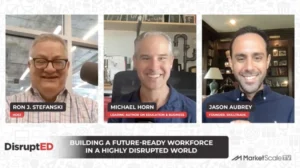Hospitality Expert Mailbag, March 4, 2019
Ultimately, hospitality is about customer service and satisfaction. Entire businesses’ success is determined on someone having a positive personal experience, whether it is a takeout restaurant or a five-star resort.
To get a professional perspective on the changes sweeping the hospitality industry, MarketScale reached out to four experts for this week’s mailbag.
Today we hear from:
Sarah Dandashy, Founder, Ask a Concierge
Jan Loov, Sous Chef, OMNI Frisco
Matt Gibbs, CMO, Co-Founder, UPShow
Barbara Castiglia, Executive Editor, Modern Restaurant Management
How have apps changed this industry in the last decade?
Sarah Dandashy: Everything is on-demand. In some aspects, travelers use traditional services less. Since they can book restaurants, hotels, nearly everything, expectations have become higher and the need to be able to book and request things from the palm of a hand has been paramount.
Jan Loov: Apps have made many more people more interested in hospitality and the food business and the whole “I am a foodie” mentality came along with it for good and bad. As far as I am concerned many apps such as yelp have made reviews of restaurants and hotels the norm and everybody is now an expert, some reviewers do not realize the implications of negative baseless reviews that have been written. That’s the down side. The upside is there is more real-time accountability in a food establishment now thanks to apps and review sites.
Matt Gibbs: BYOD (bring your own device) is changing the in-venue engagement experience thanks to apps and mobile-optimized experiences. Businesses no longer need to invest in tablets or arcade games to entertain customers, they can just activate the device that’s already in their pocket.
Barbara Castiglia: Just apps? Technology has caused tremendous cultural shifts throughout every aspect of the restaurant industry and will continue to do so. I am amazed by the restaurant technology realm and how fast things are moving. I recently visited a newly opened Shake Shack with kiosks and noted there was no learning curve or hesitation on the part of guests to use them to place orders. A few years ago, that would not have been the case.
With apps, they have to really offer value for guests to add them to their phone. I’m becoming more interested in AI/chatbots and various forms of text messaging for marketing. Technology has placed a considerable amount of data at a restaurateur’s fingertips. They just have to know how to discern what makes sense for them and that can be a challenge. The ability to use data analysis throughout the food chain is incredible, particularly for sustainability and food waste.
How can hotels fight back against the AirBnbs of the world?
SD: Hotels need to focus on the experiences they offer by upping their amenities, like pools, spas, cool bars, etc. Hotels shouldn’t be scared of Airbnbs–they should learn from them. I usually tell hoteliers to see what Airbnb is doing, as they are more agile as a company and can take more risks. By really paying attention to what is working or not working for Airbnb, it can provide a lot of insight to hoteliers. Embrace being a hotel, but stop focusing solely on “heads in beds” but the outlets and experience the hotel can offer.
People stay at Airbnbs so they can spend more money on experiences, dining out, and activities. So the best thing is for hotels to create options to draw in that crowd.
JL: A hotel with a culture of service will always win over a Airbnb. The people giving service in a hotel must be trained well and have the natural instinct of good service and treat guests with kindness and respect.
Does it matter that fewer people are dining in restaurants compared to taking out?
JL: The whole restaurant experience can never be replaced. Good food and wine in a restaurant setting will never be replaced by ordering out. It does matter big time to eat at the food establishment versus eating at home, it is just a special feeling and experience.
BC: To be successful, restaurants always need to be responsive to guests’ desires. Delivery and takeout offer profitable opportunities if done well, but people are social creatures and they want to get out and meet with friends over a good meal. Provide a consistently great experience and they will come and keep coming, but also have a firm grasp on your off-premise presence.
What is the biggest issue facing the industry right now?
JL: Skill set in cooks and servers is the biggest challenge in restaurants today, or the lack thereof I mean. Too often the idea of working in a restaurant is romanticized and what people think the business is like versus reality, which is vastly different and the shock of how much hard work is required to be really successful in a restaurant is maybe not fully understood.
BC: Staffing and retention will always be the major issue. You want staff that reflects your brand and values and it’s hard to keep good people. This is more of an issue as minimum/living wage laws are coming to the forefront across the nation. Technological integration that makes sense for each restaurant is also a challenge.
Send us your questions on Twitter for the next hospitality mailbag!
For the latest news, videos, and podcasts in the Hospitality Industry, be sure to subscribe to our industry publication.
Follow us on social media for the latest updates in B2B!
Twitter – @HospitalityMKSL
Facebook – facebook.com/marketscale
LinkedIn – linkedin.com/company/marketscale









